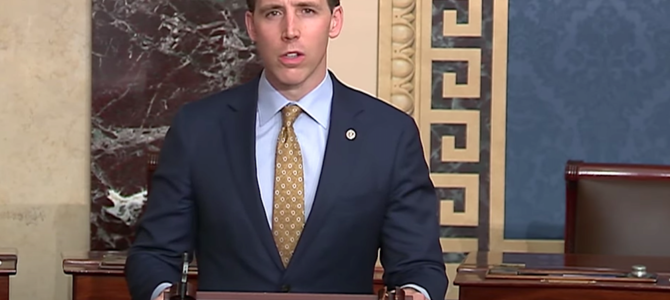Sen. Josh Hawley, R-Mo., took action against big tech companies Wednesday, writing a letter to Google’s CEO criticizing their selective censorship — most recently against The Federalist and ZeroHedge — and proposing legislation that allows individuals to sue big tech for similar future offenses.
“Your company is well aware of the central role played by advertising in the modern online ecosystem, and has spent years amassing an enormous trove of internet users’ data through the Google Ads platform,” Hawley writes in the letter to Google CEO Sundar Pichai. “That, in turn, has granted your company vast powers to shape what users see, believe, and buy. Given the breadth of Google’s data collection practices, the power of Google’s behavioral advertising toolkit, and Google’s sheer market dominance, publishers are forced to do whatever your company demands in order to effectively serve their audiences.”
Both are steps in the ongoing battle to protect citizens’ right to free speech and a free press. Google threatened to pull their ads from both The Federalist due to complaints from NBC News regarding the website’s comment section. It has sparked major discussion concerning the power of big tech to control information based on politics.
Hawley began his letter by addressing the Federalist controversy, writing that it might just be “the latest instance of Google’s long pattern of targeting any perspectives that deviate from its preferred party line.”
He criticized Google and other tech companies for the double-standard they apply to politically like-minded companies. Since these companies rely on protection from Section 230 of the Communications Decency Act for legal immunity regarding things users post, he added, it’s disingenuous and wrong for Google to then punish conservative publishers for things commenters write.
He concluded the letter with a prelude to his legislation: “This long pattern of discriminatory treatment must stop. It is well past time for Congress to act. And I assure you that Congress will.”
In the same day, Hawley proposed an amendment to the Communications Act of 1934 that would create a system of accountability for Big Tech companies. The companies are currently required to act in good faith under Section 230 Immunity to Good Samaritans Act. If the amendment were to pass, tech users nwould be able to sue the companies over their political bias in content moderatiob. If they’re found guilty, companies would be required to pay $5,000 plus legal fees to the user.
The amendment, which is cosponsored by Sen. Tom Cotton, R-Ark., Sen. Marco Rubio, R-Fla., Sen. Mike Braun, R-In., and Sen. Kelly Loeffler, R-Ga., clarifies the standard of good faith and adds legal repercussions for violations.
“For too long, Big Tech companies like Twitter, Google and Facebook have used their power to silence political speech from conservatives without any recourse for users,” Hawley said about the legislation. “Section 230 has been stretched and rewritten by courts to give these companies outlandish power over speech without accountability. Congress should act to ensure bad actors are not given a free pass to censor and silence their opponents.”









